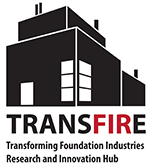Key performance indicators in sustainability reporting: what do we need to measure?
Sustainability reporting is a vital tool to provide information on an organisations’ social, economic, and environmental performance and is an essential way for organisations to demonstrate accountability to their various stakeholders. But how do companies know which metrics or key performance indicators (KPIs) they should use? The TransFIRe project through its different Work Streams (WS) is addressing the need of identifying the most suitable metrics for the foundation industries (FI), by looking at different levels for measuring and reporting performance, ranging from the process level to factory level and eventually to the “beyond the fence” level (a system view, looking from the perspective of external stakeholders, including the surrounding community, and the environment). Figure 1 - Schematic representation of the different levels for measuring performance of FIs. Process level metrics At a process level, TransFIRe researchers have created a framework to help the manufacturing industries identify the right [...]




